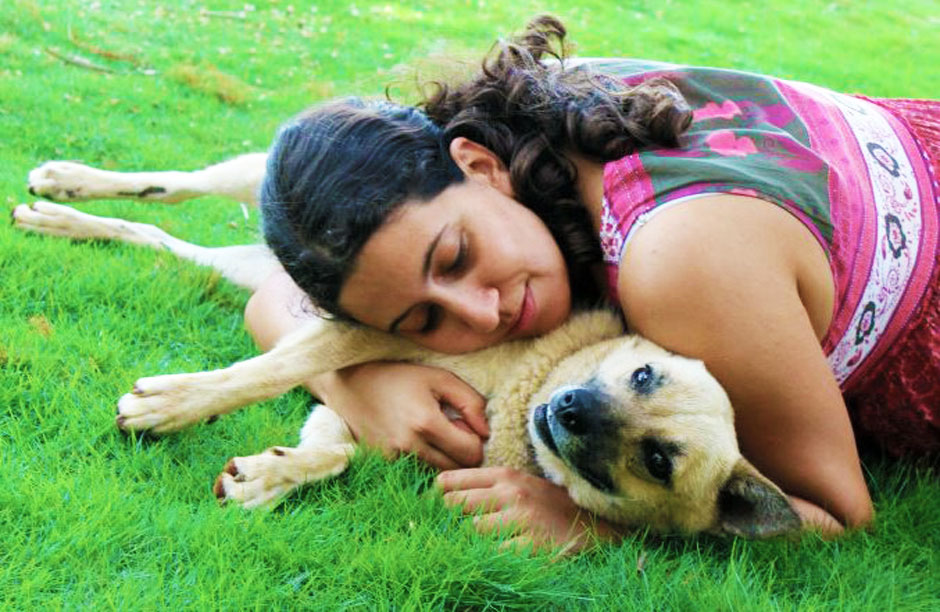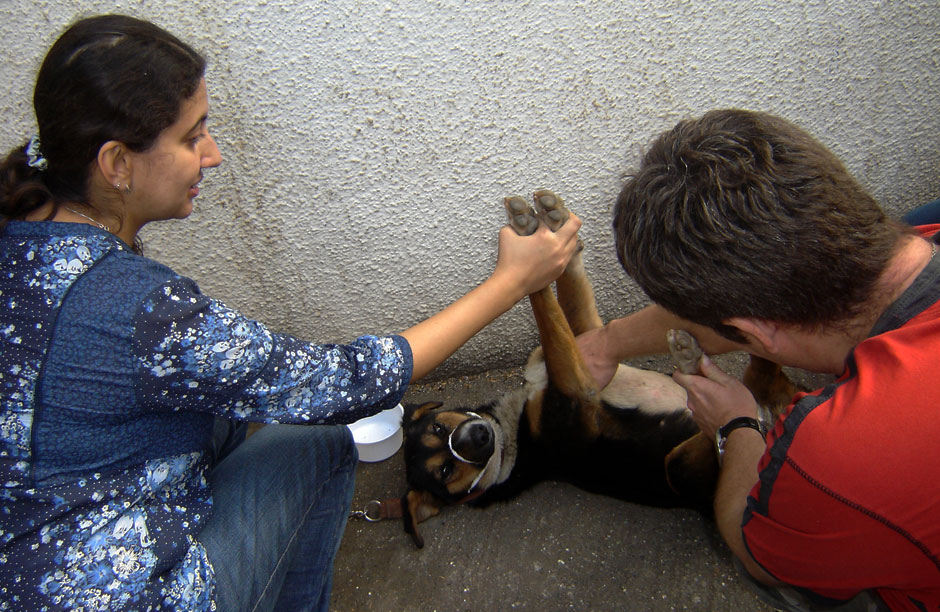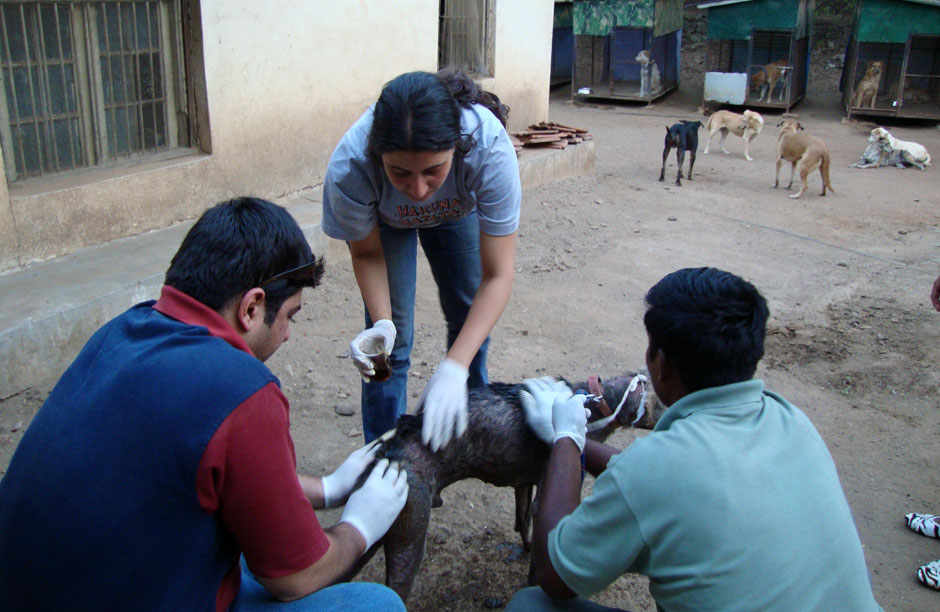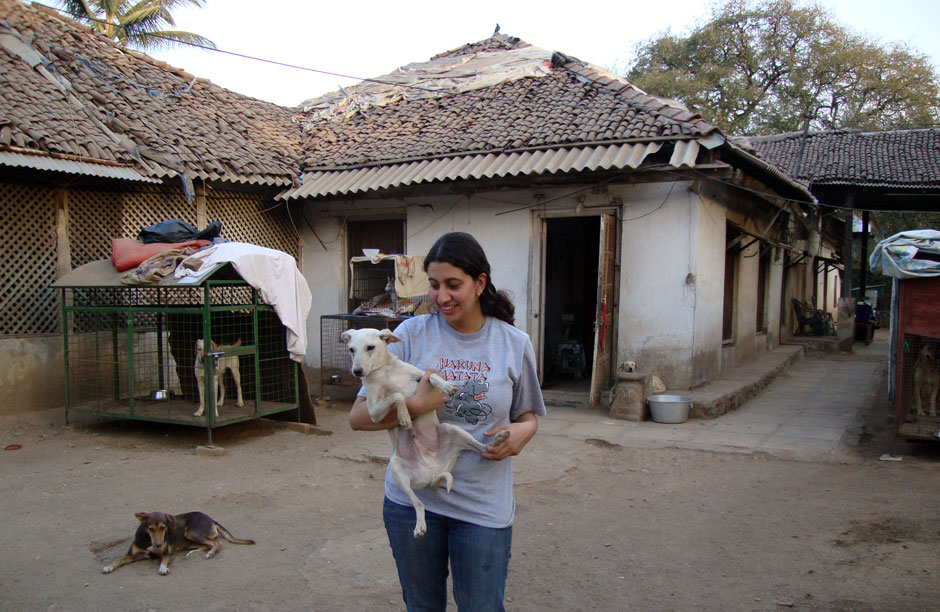PAST ISSUES
 Ayesha Ghandy founder of ResQ in Pune, India - where stray dogs, cats and animals are brought to be rescued in a town where they could easily be forgotten
Ayesha Ghandy founder of ResQ in Pune, India - where stray dogs, cats and animals are brought to be rescued in a town where they could easily be forgotten Ghandy and a ResQ volunteer perform a procedure in the field
Ghandy and a ResQ volunteer perform a procedure in the field In addition to two on staff vet technicians ResQ trains volunteers to respond to injured animals they come across in their neighborhoods
In addition to two on staff vet technicians ResQ trains volunteers to respond to injured animals they come across in their neighborhoods Ayesha with a rescue pup at the ResQ headquarters in Pune
Ayesha with a rescue pup at the ResQ headquarters in Pune
Puppy Love
By Pooja PillaiAyesha Ghandy rushes into her office with a puppy nestled in the crook of her right arm. With her left hand, she’s holding a mobile phone to her ear, and registering the details of an emergency case. Ghandy is the manager of rescue and operation at ResQ, a local organization for helping street animals in distress. In a city like Pune, the educational capital of western India and where ResQ is based, street dogs and cats are found everywhere. They often come into conflict with humans, with whom they share the shrinking resources of a fast-developing city, resulting in dogs that are run over by cars, or cats that have been set on fire out of sheer malice. On a normal day, Ghandy informs, she deals with four calls like this.
Ghandy is soon done with the helpline call (she always carries two mobiles: a personal number and the helpline number). She then talks about the recently-rescued puppy who is sitting on her lap. “His spine was injured after he was hit by a car. We’re performing a very delicate spinal surgery on him tomorrow,” she says. When ResQ picked him up, the puppy was found not just with broken limbs; his injuries were infested with maggots and he had scraped the skin off his abdomen and legs from dragging himself everywhere.
The puppy seems healthy now – apart from his limp hind legs. When Ghandy sets him down on the floor, he whines until he is picked up again. He’s clearly in the mood to play and full of energy, as he nips at Ghandy’s chin and tugs at her curls. “This is the reason I do this job,” says Ghandy, “When I see what a difference the foundation is making for these animals, I know that it is worth the hard hours and the low pay.”
On the job, Ghandy and her team have to regularly rescue cats and dogs, along with the occasional donkeys, birds and even camels. “About 90 percent of the cases we get are completely treatable, usually injuries and skin infections,” she informs. ResQ was founded in 2007 to help injured or sick animals, but the organization also neuters and vaccinates street animals. A lot of the work is done by Ghandy – attending to the helpline, co-ordinating rescues and organizing workshops for volunteers. She has two helpers, besides an office assistant who looks after the paperwork and the accounts.
What makes ResQ unusual among animal welfare groups and organizations in India, is its emphasis on medical assistance to street animals and its reliance on volunteers. Ghandy says, “We realized that we couldn’t afford to have a large number of employees, ambulances and equipment. So we started training volunteers in medical treatment of sick and injured animals. In case of an animal emergency, we contact the volunteers who are closest to the distressed animal.” Ghandy also educates people about the importance of neutering and vaccinating street animals, and encourages the adoption of street animals as pets.
Ghandy grew up surrounded by animals. In the tiny hill town of Mahabaleshwar, the farm she was raised on had dogs, cats, rabbits and a horse. After finishing college in Mumbai, she got a job in the corporate sector and found herself posted in Belgium, where she did some volunteer work at an animal shelter. Later, when she had to move back to India, she decided that she wanted to dedicate herself to working with animals. “Even now, when my friends see me bone-tired after a long day of work, and still taking calls, they ask me why I can’t do a regular job. And if I want to do this kind of work, why not with humans?” she say, “I tell them that animals are grateful and humans often are not.”
Ghandy and her team often encounter injured animals which are aggressive and traumatized. But these encounters are not as bad as the ones with hostile people, most of whom just want the animals to be put down or taken away and dumped somewhere else. “The surprising thing is that a lot of educated and supposedly well-informed people are likelier to mistreat animals. We try and initiate legal proceedings against them, but it difficult to follow up. Witnesses are not interested in testifying or we simply can’t spare the manpower to pursue the case.”
Often, however, the unlikeliest of people can be sympathetic to animals. “Most of our rescue calls are from people who have few resources themselves or those who own tiny corner stores. They will share their food with the animals, keep an eye out for them and once we have treated the animals in question, they’re happy to continue looking after them.”
